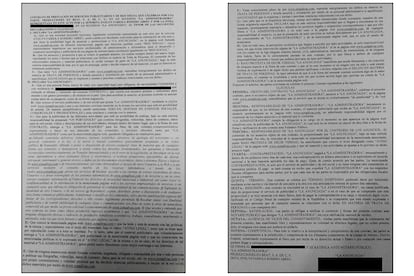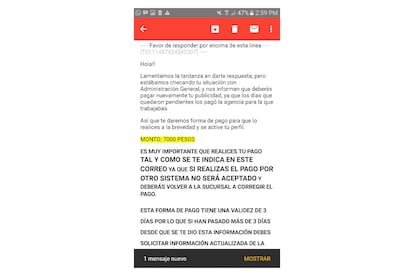Ignacio Antonio Santoyo Cervantes, The Soniused agencies that were part of a trafficking structure for sexual exploitation to integrate the catalog of zonadivas.com, a web portal that he founded and that in 2017 alone came to exhibit thousands of photographs of more than 500 Latin American women who advertised their sexual services there.
He modus operandi of Santoyo Cervantes in complicity with the agencies is revealed from a journalistic investigation with dozens of testimonies and thousands of unpublished documentary sources, such as audios, videos, text messages, images, files and advertising contracts in the documentary series The Portal, the hidden history of Zona DivasThe four episodes, produced by Mezcla and available on Netflix, address the stories of Venezuelans Kenni Finol, Andreína Escalona, Génesis Gibson, Wendy Vaneska de Lima, and Argentine Karen Grodziñski, who were victims of femicide during 2017 and 2018.
In 2018, the portal went offline after operating with impunity for almost two decades; there are precedents of divas.com dating back to 2001. Its closure was voluntary, and neither local nor federal investigations were sufficient to force it to cease to exist by order of the authorities; there is also no justice for all the victims of femicide, much less for the hundreds of victims of trafficking.
The main traffickers are free. The 29-year prison sentence for human trafficking in the form of sexual exploitation and directing illicit advertising against Santoyo Cervantes was revoked in November 2021 by a magistrate who in his ruling argued “insufficient evidence.”
Although Evelyn Fabiola Romero Abreu, the administrator of the portal, accepted responsibility for having been a trafficker, having been sentenced to less than five years, she was granted a fine in lieu of the sentence. “She paid the fine and was released,” said Laura Borbolla, head of the General Coordination of Accusation, Procedure and Prosecution of the Attorney General’s Office of the capital, in an interview.
Hitch, transfer and accommodation
The agencies were intermediaries between the portal and the victims of trafficking, who reported having been contacted through the portal to send their full-body photos and work in Mexico if they met the “diva” profile. Thus, they acquired a debt that began with the paperwork to travel abroad, the flight, the clothes, the makeover and the photographs to be published on zonadivas.com.
“The main agency belonged to the same owner of the page,” says Brenda Stewart about El Soni, escort Argentine who advertised under that pseudonym on Zona Divas. The “modeling” or “hostess” agencies were actually a euphemism to refer to the groups that formed the structure of trafficking in women for the purposes of sexual exploitation.
Soni decided who appeared on the “gold” pages, that is, the first pages of the portal, and at what monetary cost or in exchange for having unprotected sex with him. “The only way we had to work was by knowing Soni. Whenever something happened with any girl, any problem with the agency, he would block you and the requirement he put in place to return to the page was a party with drugs, having threesomes,” says Daniela, escort Venezuelan retired from Zona Divas, whose name was changed to share her testimony.
Once they had El Soni’s validation, the women signed a publicity contract, supposedly before a notary, with Producciones en Beat, a company whose articles of incorporation reveal that Santoyo Cervantes was the main shareholder and his relatives were partners.
Soni negotiated directly with the owners of the “agencies” that recruited and hired Latin American women in their countries of origin. Most of the time, they were unaware of the economic, psychological, physical and sexual violence they would face or they were told that they were going to dedicate themselves to something completely different. “You are going to go to Mexico, you are going to be in a family home, that is, clean houses, take care of children…”, they lied to Luna, a escort Retired Venezuelan from Zona Divas who managed to escape from her traffickers and prefers that her real name be changed.

The transfer to Mexico was facilitated by direct contacts that the agencies had in immigration. They agreed with the colluding personnel on which airlines and times to travel in exchange for a payment that was added to the debt. “You know that I have my contact, right?, with whom I have always worked and I had already given him all the information about the girl. But this man works with the money in advance,” says Andreína Escalona in an audio recording. escort Venezuelan who advertised on Zona Divas and also had an agency.
Accommodation, another phase of trafficking, occurred in apartments where the female victims lived in overcrowded conditions and paid disproportionate rents. From their home, a driver would take them to hotels where they would perform sexual services for which they earned around 2,500 pesos per hour or more, but they had to pay a 40% commission. “We had to pay a 400-peso taxi fare, then 700 pesos for food and they still kept 1,000 pesos as commission. In other words, the agency charged us for everything,” says Candice Miller. escort retired Colombian who used that pseudonym to advertise on Zona Divas.
In addition to zonadivas.com, the owners of the agencies were the ones who benefited the most from sexual exploitation. Photographers, stylists and receptionists who answered the phones of the agencies also participated in the chain of trafficking crimes. escorts and they scheduled up to 12 services a day, regardless of whether they were sick or menstruating. “They didn’t even let me touch a peso of each service I did, not for food or anything. I had to ask for tips to be able to eat,” says a Vene
zuelan woman who was advertised on Zona Divas in an audio recording.
The agencies’ control over trafficking victims meant that they could not invite anyone to the apartment where they were staying, they could only leave if they told them where they were going, and they were prohibited from interacting with clients. Sometimes their passports were retained to prevent them from escaping without paying the debt.

Mix
Zona Divas and a series of femicides
Women who, after about three months, managed to pay off their debt of tens of thousands of pesos could become independent sex workers, as happened with Candice Miller, or they resorted to setting up their own agencies. Some of them, unlike those who had brought them to Mexico, tried to be less violent with the women. escorts under his control. “You have been in many agencies and you know how bad they are and I have been there too, that is why I do not want to make those mistakes,” reads a message written by Argentine Karen Ailén Grodziñski.
But when trafficking victims became traffickers, they competed for clients, which generated more violence and insecurity. Such was the case of Andreína Escalona, who received death threats for having her own agency and publishing on zonadivas.com and on February 8, 2017, she was beaten at the V Boutique hotel. “That is like taking down agencies, because they know she has women, so they don’t work for her anymore. This is like cartels, but for women, something like that,” says Kenni Finol, who was the face of Zona Divas, in an audio.
Andreína Escalona was murdered in December 2017. She was shot while riding in a car in Nuevo León and died in hospital. In February of that year, Wendy Vaneska de Lima Cortés was murdered at the Príncipe hotel. In November, Venezuelan Génesis Uliannys Gibson Jaimes was murdered at the Platino hotel, and in December, Argentinian Karen Ailén Grodziñski was murdered at the Pasadena hotel.

Despite the fact that all of them advertised on Zona Divas, the portal failed to comment on the series of femicides, most of them in hotels in Mexico City. It was not until February 2018, when Kenni Finol’s body was found in the State of Mexico, that a statement was issued. “Kenni was the model who appeared in our catalogue. A model who was paid to give us her face… She also advertised with us, and she paid us for it. And that suited HER, and we hope she got a lot out of it,” said zonadivas.com.
Two months later, in April 2018, zonadivas.com announced its closure. However, that does not mean that the trafficking agencies have been dismantled by the authorities; on the contrary, sexual exploitation continues now on other portals. “The investigation initially stems from Zona Divas, and when Zona Divas ceased operations, the investigation continued with Boutique VIP,” declared Víctor Hugo Enríquez, then head of the Federal Police Investigation Division Unit, in a statement. conference press release in April 2019.
Sign up for the free EL PAÍS Mexico newsletter and to WhatsApp channel and receive all the latest news on current events in this country.
#trafficking #agencies #sexual #exploitation #Zona #Divas #portal